- Home
- Joe R. Lansdale
Dead in the West Page 3
Dead in the West Read online
Page 3
"Speak ahead. This here is Caleb Long. Sometimes he's a deputy of mine."
The Reverend nodded at Caleb, who examined him with a look of wry humor.
Turning back to the sheriff, the Reverend said, "Sheriff, I'm a man of God. I travel from town to town teaching and spreading the Word...."
"And filling your offering plates," Caleb said.
The Reverend looked at Caleb. Considering that for some time that was exactly what he had been doing, he could not find it in himself to anger. He nodded.
"Yes, I admit that. I'm a man of God, but like you, I must eat. But I do bring something with me besides a sermon. I bring the Word of our Lord and eternal salvation."
"You fixin' to pass the plate now, Reverend? If so, don't push it my way. I don't buy nothing I can't see."
"I suppose I get a might carried away when the subject of the Lord is brought up," the Reverend said.
"You brought it up," Caleb said.
"So I did."
"Pardon me," Matt said, "but Reverend, do you think we could cut through the horseshit here and get down to cases? What can I do for you?"
"I would like to rent a tent, and with your permission, hold a night of gospel singing, prayer, and bringing lost souls to Jesus." Glancing at Caleb. "And passing the offering plate."
"It's all right by me," Matt said, "but we have a preacher.
He might not take too kindly to an outside Bible yacker. And as far as I know, he's the only one around these parts with a tent like you want. He used to travel-preach too."
"That a fact," the Reverend said.
"You go down the street," Matt pointed in a southerly direction, "till you come to a church, and Reverend Calhoun lives in part of it. You tell him it's okay by me if it's okay by him."
"Thanks," said the Reverend.
Caleb stood, tossed money on the table for his breakfast. He lifted one leg and cut loose with a loud fart.
For a moment the cafe went quiet. Customers stared at him.
Loud enough for everyone to hear, Caleb said, "Don't let it slow you none, folks. My mama didn't teach me no manners." He turned to Matt, "See you," then to the Reverend,
"See you in church, preacher boy," and he went out.
"Unusual sense of humor your friend has," the Reverend said.
"He's a little unrefined."
"I suppose that's the word for it."
"He was trying to embarrass you."
"He did the job nicely"
"He hates preachers. One raped his mama when he was a boy."
"And what about you? Do you hate preachers?"
"Are you an honest-to-God preacher?"
"I am."
"Then do me a favor, say a little prayer for me. I think I need one."
Matt stood up, tossed money on the table, and went out.
When he was gone, the Reverend said softly, "I will."
X
After breakfast, the Reverend paid up and started out the door. As he opened it, a beautiful dark-haired woman came in. The Reverend was stunned. She looked just the way he figured his sister would look now. He stood in front of her for a moment too long before stepping aside to let her pass.
As she did, she smiled and he tipped his hat.
Behind the woman was an elderly man with cigar-ash colored hair, glasses, and a glance that could drop a buffalo at fifty paces.
The elderly man took the woman's arm, walked her to a table. When they were seated, he turned to look back at the Reverend who was still dumbly holding the door.
The Reverend nodded, and as the woman smiled at him a second time, he hastened out.
As he walked toward the church, he had a sudden sinking in his stomach. He knew the woman was not his sister. They were not twins in appearance, but she certainly reminded him of her, and the old lust of her memory rose in his loins.
Was the woman one of God's little tests?
If so, she was a good one. He was as shook as an Indian rattle.
As he passed the livery, he saw David standing in the doorway grooming a horse. David waved. The Reverend waved back and continued down the street, the image of the woman still burning in his brain.
…
Unheard by David, when the Reverend walked by the livery — in the loft, hidden beneath loose hay — a crate had shifted ever so slightly in the Reverend's direction, as if it were a compass needle trying to point true north: the Reverend.
When the Reverend came to the end of the street, smack dab in the middle of it was a large white church with a large white cross sticking up into the sky. Out beside the church was a slope-off house, and beside that was a fenced-in garden, and in the garden, working furiously at weeds with a hoe, was Reverend Calhoun.
Jeb knew he was a Reverend at a glance. Like his father, Calhoun wore a constant mask of stern Baptist conviction. He worked at the weeds in his desperate little garden like the Lord himself chopping down sinners.
Calhoun lifted his head, leaned on his hoe, and wiped his sleeve at his sweaty forehead.
As he did, he laid eyes on the Reverend. He frowned slightly from habit, went to lean on the fence surrounding his garden.
The Reverend leaned on it as well.
"Good day, sir, I'm Reverend Jebidiah Mercer. I've come to ask you a favor."
"A favor?"
"One that any good Christian could not refuse."
"We'll see about that," Calhoun said.
"The sheriff gave me permission, if it's all right with you, to hold a night of gospel here in Mud Creek. He wanted to be sure you agreed, as he didn't want there to be conflict, though I hardly see how there could be conflict between us—two men of God."
"That so?" Calhoun said.
The Reverend smiled. He seldom did that of his own free will, only out of habit when he was after something he wanted. He felt as if his silver-tongued approach was not doing much good against this old preacher dog.
"He also said that you had a tent, and I would need a tent. I'd like to rent it for the preaching."
"I haven't given you permission for any preaching yet. You did say the sheriff said he wanted you to have my permission, did you not?"
"I did at that. I'm willing to pay nicely for the rental of that tent, by the way."
"How nicely?"
"You name it."
"Six bits."
"A popular price," said the Reverend. He reached in his pocket for the money.
"I choose the night you preach."
"I wouldn't want it to conflict with your services. You choose the night."
"Very well, Saturday."
The Reverend stopped the hand with the money.
"Saturday? Now Reverend Calhoun, I want to abide by your wishes, but that is the worst night of the week. The saloon will be filled."
"Take it or leave it, Mr. Mercer."
"Reverend Mercer."
"Take it or leave it."
Frowning. "I'll take it." The Reverend slapped the money into Calhoun's outstretched palm.
Calhoun counted it out, slipped it into his pants pocket.
"You sure you're a preacher?" he asked.
"Don't I look like one?"
"You don't see that many with a gun. Carrying a pistol is hardly part of the Lord's work, Mr. Mercer."
"Reverend Mercer."
"It seems mighty peculiar that you carry a revolver like a common gunslinger, you supposedly being a man of peace,"
"Who said the Lord's work is peaceful? Sometimes it's necessary to bring a sword to deal with the infidels... or a gun...." Smiling. "Besides, you haven't heard any of my sermons. I have to have something to persuade attendance with."
If Calhoun caught the joke, he didn't show it. "Would you like to get the tent, Mr. Mercer.
I have work to do."
"Right. The tent."
II
The interior of the church was sparse. Rows of pews, a pulpit on a raised platform, and behind it on the wall: a huge, crude, wooden cross bearing a cruder Jesus o
f the German grotesque school.
Dead center of the middle row of pews was a door. Calhoun led the Reverend there and opened it. He reached inside, took hold of a kerosene lamp, and lit it. He turned up the wick and they went down a row of creaking stairs.
The Reverend could see a high window to the rear covered with a thick curtain. Light crept through it. Though the room was deep, the roof of it was still on a level with the rest of the church. It appeared that at one time there had been a second floor, but it had been torn away to make room for all the things stored there, stacked atop one another like dog turds.
There were boxes, barrels, bundles, and crates. Against the wall—covered in dust—was a rack of Winchesters, double-barreled shotguns, and a couple of ancient Sharps rifles.
Near them, were several crates marked AMMUNITION and ARMS.
"For a man who dislikes guns," the Reverend said, "you certainly have a few on hand."
"Don't be snide with me, boy.... When they first built this church it was used as storage, and as a sort of fortress against outlaws and Indians.... Well, we never really had much of either. The guns are still here, and there are bars on most of the windows. Come next year, I'm taking the bars out, and I'm going to see if I can't get the town council to move all this out of here. I could put the space to better use."
"What's in all these other crates?"
"Tools. Some clothes. Odds and ends. Pistols and ammunition."
The Reverend walked over to the gun rack and looked. Though some of the guns had spots of rust on them, they looked to be in pretty good shape. The dried-brick walls must have been pretty air tight.
"Here's the tent, Mr. Mercer."
"Reverend Mercer," Jeb said turning.
III
He had a relapse.
After he and Calhoun dragged the massive tent upstairs, and the Reverend hired a wagon to haul it over to The Hotel Montclaire, then hired a fistful of boys to help him carry it up to his room, he saw the woman again.
He had come out of the hotel onto the sidewalk with the boys, and he was paying them each—six bits of course—when he saw the dark-haired woman who looked like his sister crossing the street with the elderly man.
She was holding the man's arm firmly, and she turned and looked in the Reverend's direction.
It was a good distance between them, but it was as if the Reverend could feel the aftereffect tingling of a close-strike lightning bolt. It made his groin ache and-his soul feel bad.
He went upstairs, locked himself in his room, and masturbated to the woman's image.
Then he got back on the whisky.
There was yet another bottle in his saddlebags, and he took it out and resumed his drinking position on the bed. He felt totally unworthy of the second chance God had given him. He had messed it up. Here he was, once again, with the devil juice which he could not handle, and here he was lusting after his sister or a woman who brought her to mind, throbbing his manhood with his hand like a schoolboy. He had the willpower of a rabid dog.
He knew the night would come and with it would come the dreams—the boat down the river of hell with the spider-thing at the end.
There was a knock on the door.
The Reverend was amazed to find that he had thrown the whisky bottle to his left hand and drawn his Navy from his pants as easily as he had drawn his lily out earlier and stroked it until it gave dew.
He rolled over to sit on the edge of the bed.
He put the whisky bottle on the floor, stood, and put the revolver and himself in his pants again.
There was another knock.
"Hold your horses," the Reverend said.
He opened the door.
Looking up at him was David from the livery.
IV
"Don't tell me," the Reverend said. "The price of my horse has gone up another six bits, and I have to supply the currycomb."
David ignored him, sniffed.
"Smells like a drunk's nest in here—and maybe like you been greasing your axle."
"A boy your age should know," the Reverend said, somewhat embarrassed that he had been found out.
"Yeah, but I got an excuse. I'm too young for women."
"What can I do for you?"
"I thought you preachers didn't approve of strong drink."
"I don't, but I drink it anyway. Medicinal purposes.... Something I can do for you, or you just come by to give me a temperance lecture?"
"You don't seem quite as pert and godly as you did yesterday, if you don't mind me saying so, Reverend." David smiled broadly.
"Would you like me to wipe that smile off your face?"
David quit smiling. "No thanks."
"Then for the sake of heaven, get on with it. What do you want, before I die of boredom?"
"That gun you carry. You any good with it?"
"I generally hit what I aim at, even if I throw the gun at it."
"Yeah, you look like a man that could do that—I want a shooting lesson."
The Reverend took hold of the door as if to shut it. "I don't give lessons, boy. Get your pa."
"He don't teach me nothing but hard work."
"Builds character, good day."
"I'd pay you."
"You'd pay me to teach you how to shoot?"
David nodded.
"Why do you want to learn so bad?"
"Something a man ought to know, I reckon. Papa says I ain't much at doing things a man ought to do. Says I'm short of hard work and the ways of a man."
"You're just short, that's all. You're a boy."
"Says I'm like my mama—a dreamer."
"My father said the same thing of me."
"Did he?"
"Among other things."
"Can I quit standing out here in the hallway?"
"I guess."
David came in, and the Reverend closed the door, sat back on the bed. David stood.
The Reverend picked up his whisky and took a swig.
"I wouldn't have figured you for a drunk," David said.
"Appearances are deceiving," the Reverend said, and drank again.
'"You look—I don't know—special. Like you really are the right hand of the Lord—you know?"
"No."
There was an awkward silence.
"Look, I'll give you a shooting lesson," the Reverend said. "Tomorrow morning. But I don't want your money. I want a favor."
"Name it. Anything."
"Slow down. Don't agree to anything until it's been explained to you. You might be sending your head to Old Glory on a one-way ticket without meaning to. Hear me out."
The Reverend nodded at the tent on the floor.
"Got a sermon to do Saturday night. I'll need some boys to put that tent up for me. I hired me some to bring it upstairs, but I didn't like their work. I did most of it, and I sure don't want a bunch of loafers when it's time to put it up."
"I can do that. I know some good workers, I..."
Holding up a hand. "Wait a minute. I also need some boys to pass out a few bills I'm going to have the paper office print up. They'll announce the sermon's time and place.
Can I depend on you to get those passed around and tacked up around town?"
"You can."
"Good. Now run along. I've got a headache."
David nodded. "Reverend—you've probably had enough whisky, don't you think?"
"I'll be the judge of that. Now get out before I bounce you out."
"Yes sir."
"Oh, one other thing. While I'm giving you this shooting lesson, while we're out in the country, I'd like to get you to help me to cut a few poles for the tent." The Reverend stood. "And here, take some money and rent us a wagon from your pa. Tell him I'm hiring you for some work. He'll like that. Make him feel good to know you're out there sweating."
"Let's see," David said. "Cut some poles, put up a tent, pass some bills out, and rent a wagon—want me to just go on and preach your sermon for you, Reverend?"
"Very funny. A regu
lar Eddie Foy. Now go."
David went.
The Reverend closed the door, sat down on the bed again, and picked up the whisky bottle. It was halfway to his lips when he thought of something David had said. "You look—I don't know—special. Like you really are the right hand of the Lord..."
"Damn me," the Reverend said, and stood up.
Carrying the bottle with him, he walked over to the window and looked out. He saw David crossing the street, a few pedestrians.
He turned and looked in the mirror. He did not like what he saw. He turned back to the window and poured the whisky out of it, then using his gun butt, he broke the bottle and tossed it in the trash box.
Returning to the mirror he examined himself again. He didn't like what he saw any better, but he had made a decision. No more whisky to bind him like chains. He would do God's bidding. He would be what David had called him: "the right hand of the Lord."
Suddenly, the Reverend slammed a fist into the mirror and shattered it, cutting his hand in the process. He had said and done all this before.
He held the injured hand over the washbasin and looked at his shattered reflection.
Somehow, that looked better to him. 'Tm trying, Lord, I'm trying."
He washed his hands clean in his slow, ritualistic manner, as if ridding himself of some foul slime he could feel and smell but could not see.
And then it came to him. If the dark-haired woman was a test, David had been an aid from the Lord. A dose of strength. He was not lost after all.
He looked in the mirror again, and this time he laughed, and thought: "Staying in this damned hotel is going to be expensive."
V
In a crate, in the loft of Rhine's livery—another lay in slumber—away from the light, wrapped in euphoria, an inner-clock beating away the minutes of daylight, ticking them off until nightfall.
That was when it would all begin.
Long about sundown, Joe Bob Rhine called it a day.
He sent David home ahead of him. He wanted to walk home by himself and not have to hear any foolish kid chatter. It had been a rough day.
As Rhine closed the doors of the livery, slipped the big, gray padlock into place, the last of the sun played out and gave it up to the dark. And when the lock clicked into place, Joe Bob thought he heard something move in symphony to the sound—something like a creaking noise.

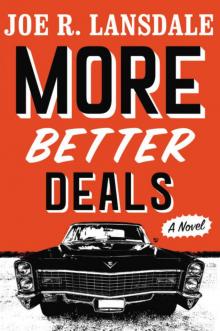 More Better Deals
More Better Deals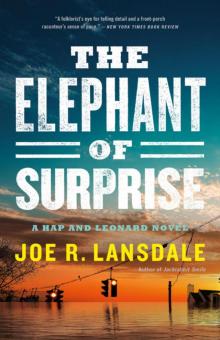 The Elephant of Surprise
The Elephant of Surprise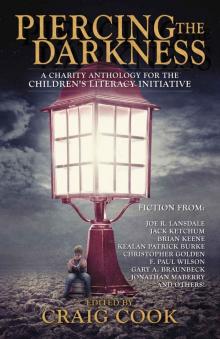 Piercing the Darkness: A Charity Horror Anthology for the Children's Literacy Initiative
Piercing the Darkness: A Charity Horror Anthology for the Children's Literacy Initiative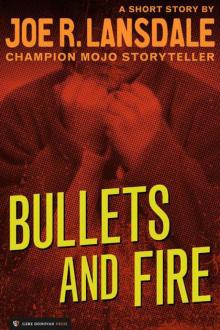 Bullets and Fire
Bullets and Fire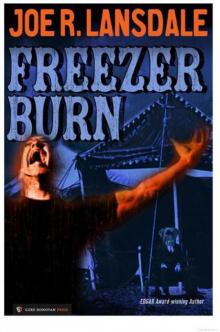 Freezer Burn
Freezer Burn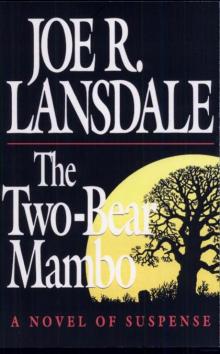 The Two-Bear Mambo
The Two-Bear Mambo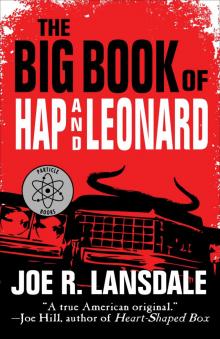 The Big Book of Hap and Leonard
The Big Book of Hap and Leonard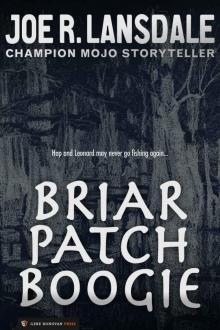 Briar Patch Boogie: A Hap and Leonard Novelette
Briar Patch Boogie: A Hap and Leonard Novelette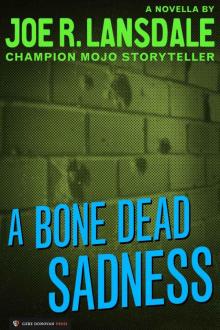 A Bone Dead Sadness
A Bone Dead Sadness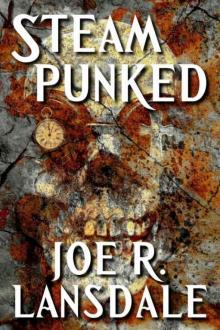 Steampunked
Steampunked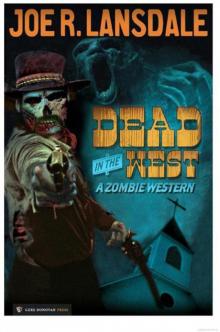 Dead in the West
Dead in the West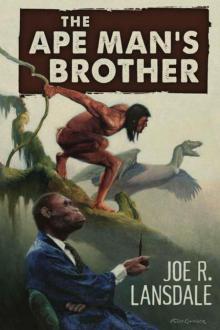 The Ape Man's Brother
The Ape Man's Brother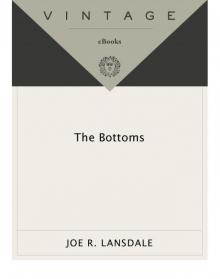 The Bottoms
The Bottoms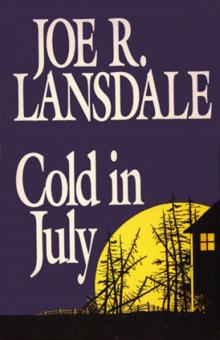 Cold in July
Cold in July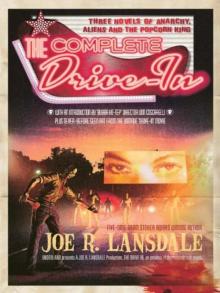 The Complete Drive-In
The Complete Drive-In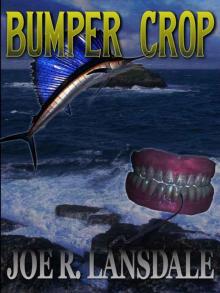 Bumper Crop
Bumper Crop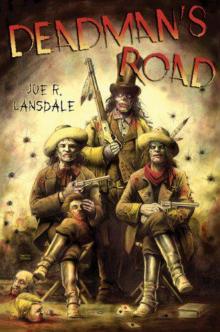 Deadman's Road
Deadman's Road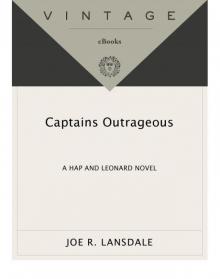 Captains Outrageous
Captains Outrageous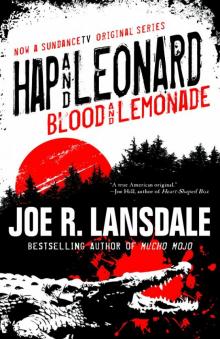 Hap and Leonard: Blood and Lemonade
Hap and Leonard: Blood and Lemonade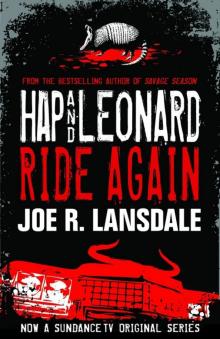 Hap and Leonard Ride Again
Hap and Leonard Ride Again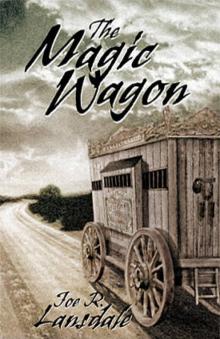 Magic Wagon
Magic Wagon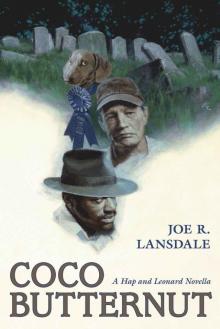 Coco Butternut
Coco Butternut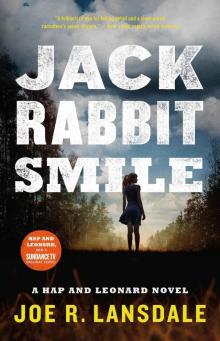 Jackrabbit Smile (Hap and Leonard)
Jackrabbit Smile (Hap and Leonard)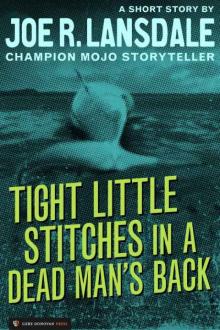 Tight Little Stitches in a Dead Man's Back
Tight Little Stitches in a Dead Man's Back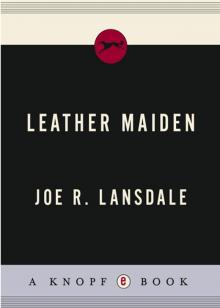 Leather Maiden
Leather Maiden Cold Cotton: A Hap and Leonard Novella (Hap and Leonard Series)
Cold Cotton: A Hap and Leonard Novella (Hap and Leonard Series)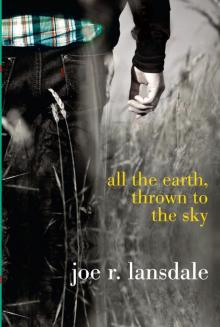 All the Earth, Thrown to the Sky
All the Earth, Thrown to the Sky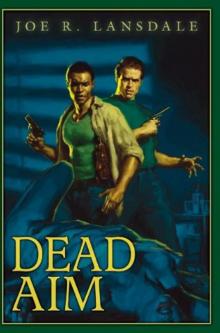 Dead Aim
Dead Aim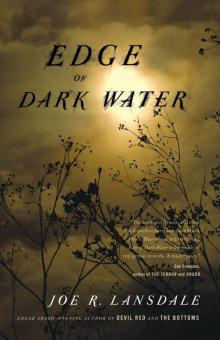 Edge of Dark Water
Edge of Dark Water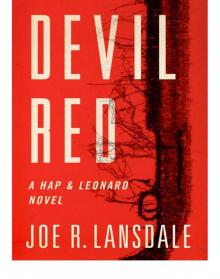 Devil Red
Devil Red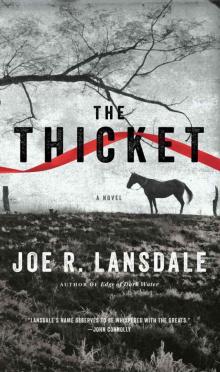 The Thicket
The Thicket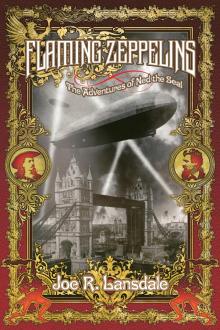 Flaming Zeppelins
Flaming Zeppelins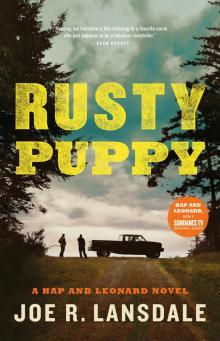 Rusty Puppy
Rusty Puppy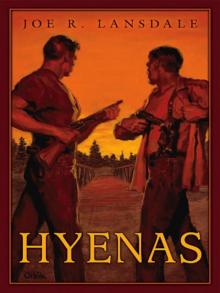 Hyenas
Hyenas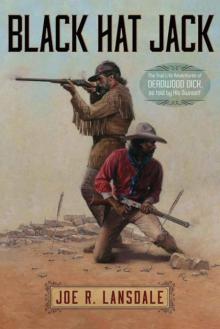 Black Hat Jack
Black Hat Jack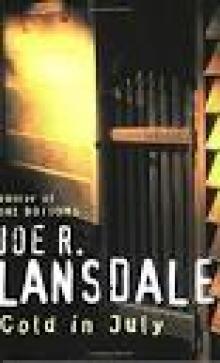 Rare Lansdale
Rare Lansdale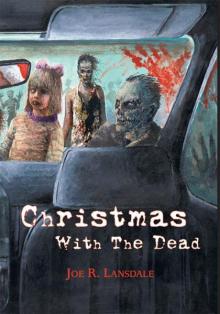 Christmas With the Dead
Christmas With the Dead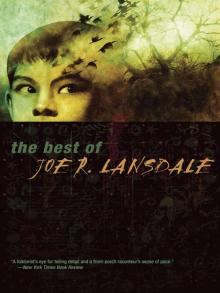 The Best of Joe R. Lansdale
The Best of Joe R. Lansdale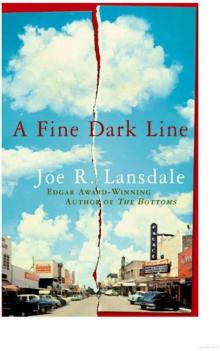 A Fine Dark Line
A Fine Dark Line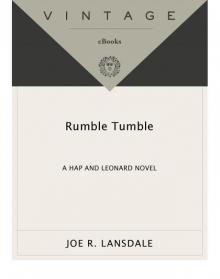 Rumble Tumble
Rumble Tumble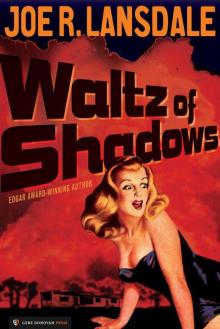 Waltz of Shadows
Waltz of Shadows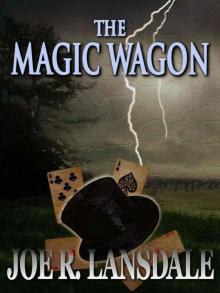 The Magic Wagon
The Magic Wagon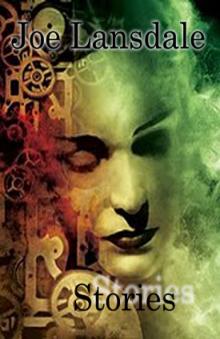 Stories (2011)
Stories (2011)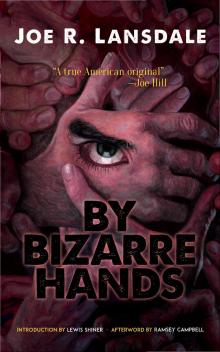 By Bizarre Hands
By Bizarre Hands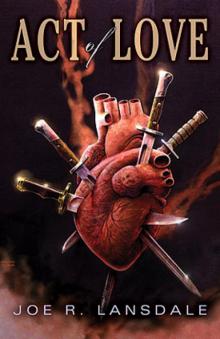 Act of Love (2011)
Act of Love (2011) Honky Tonk Samurai (Hap and Leonard)
Honky Tonk Samurai (Hap and Leonard)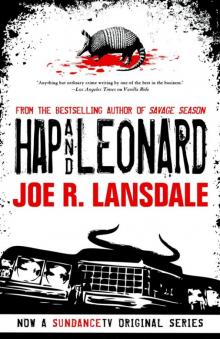 Hap and Leonard
Hap and Leonard A Pair of Aces
A Pair of Aces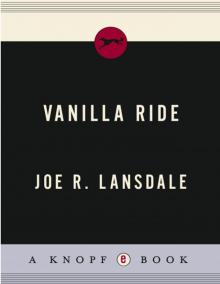 Vanilla Ride
Vanilla Ride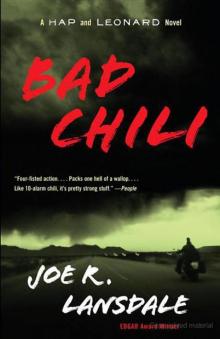 Bad Chili
Bad Chili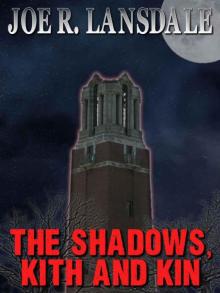 The Killer's Game
The Killer's Game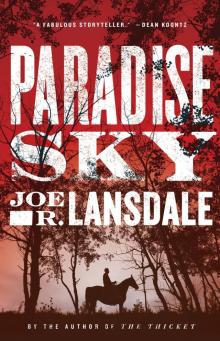 Paradise Sky
Paradise Sky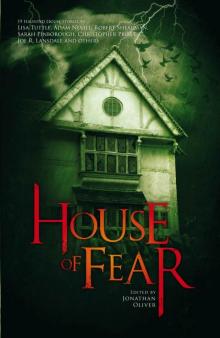 House of Fear
House of Fear Lost Echoes
Lost Echoes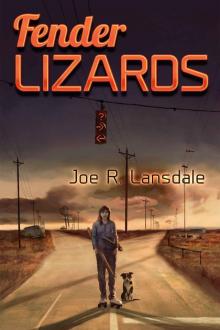 Fender Lizards
Fender Lizards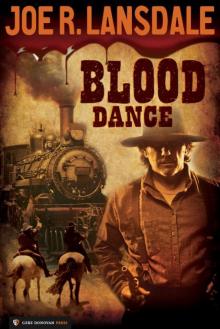 Blood Dance
Blood Dance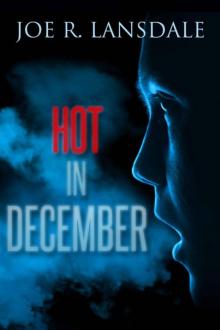 Hot in December
Hot in December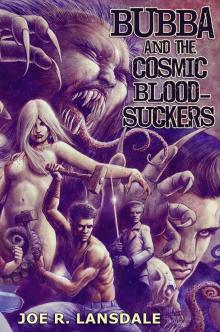 Bubba and the Cosmic Blood-Suckers
Bubba and the Cosmic Blood-Suckers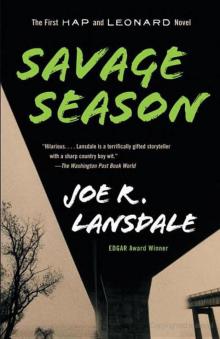 Savage Season
Savage Season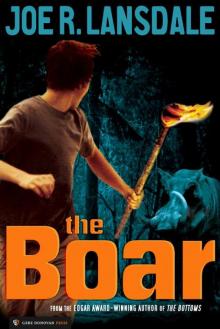 The Boar
The Boar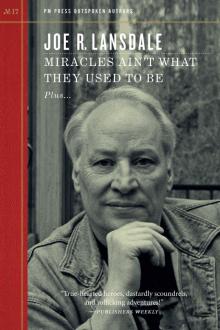 Miracles Ain't What They Used to Be
Miracles Ain't What They Used to Be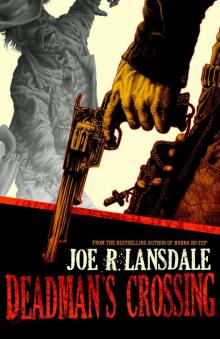 Deadman's Crossing
Deadman's Crossing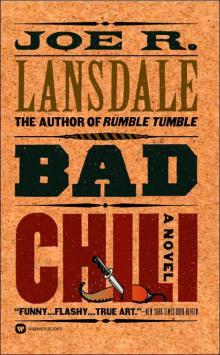 Bad Chili cap-4
Bad Chili cap-4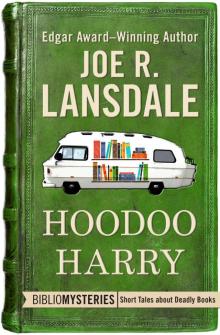 Hoodoo Harry
Hoodoo Harry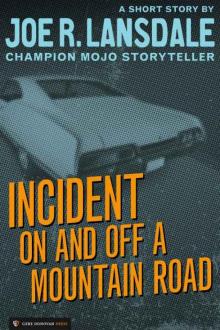 Incident On and Off a Mountain Road
Incident On and Off a Mountain Road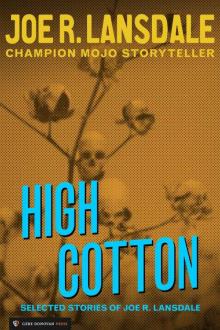 High Cotton: Selected Stories of Joe R. Lansdale
High Cotton: Selected Stories of Joe R. Lansdale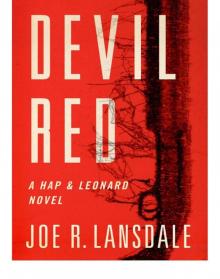 Devil Red cap-8
Devil Red cap-8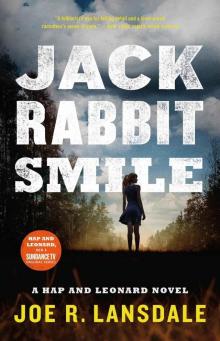 Jackrabbit Smile
Jackrabbit Smile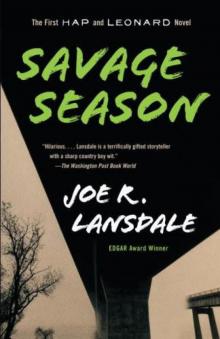 Savage Season cap-1
Savage Season cap-1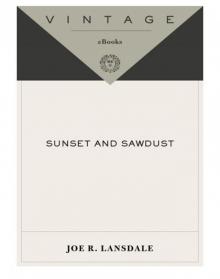 Sunset and Sawdust
Sunset and Sawdust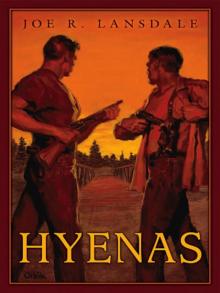 Hyenas cap-10
Hyenas cap-10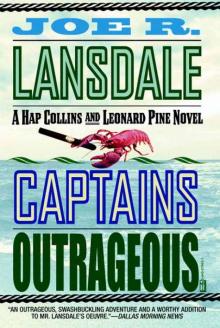 Captains Outrageous cap-6
Captains Outrageous cap-6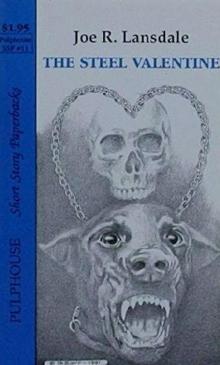 The Steel Valentine
The Steel Valentine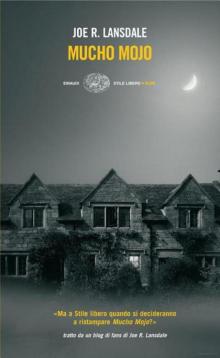 Mucho Mojo
Mucho Mojo Vanilla Ride cap-7
Vanilla Ride cap-7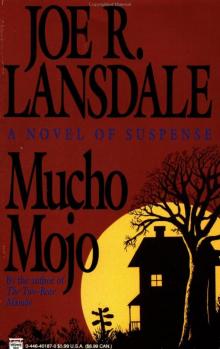 Mucho Mojo cap-2
Mucho Mojo cap-2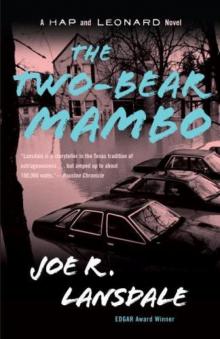 The Two-Bear Mambo cap-3
The Two-Bear Mambo cap-3